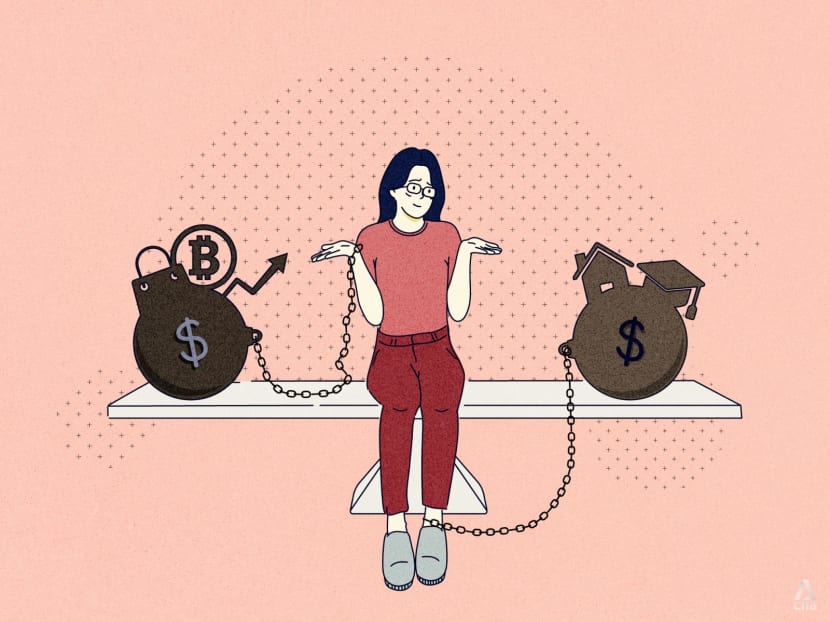‘Good debt’ may exist in theory, but it’s a different matter in reality
The concept of a “healthy” or “good” debt has been talked about, but as with any sort of borrowing, there are things to look out for before taking a loan.

Financial experts warned that it is risky to take a loan for investments in hopes of higher returns. (Illustration: CNA/Samuel Woo)

This audio is generated by an AI tool.
While doing a yearly review of my finances earlier this year, a financial adviser I met suggested buying an insurance policy that might yield attractive returns.
It was a tempting prospect but the annual premiums were beyond my means.
The financial adviser’s suggestion? Take a loan with an interest rate lower than the insurance policy’s potential returns.
I was bewildered by the notion as I had grown up being taught by my parents that taking on debt was to be avoided at all costs, if possible.
I had also read one too many reports warning that people can spiral into debt if they do not manage their loans well.
Speaking to this financial adviser, however, made me wonder if I was just being overly fearful of debt and if I could leverage such an option to my advantage.
In short, the answer is, don't do it unless you have money you are prepared to lose, because managing an investment and a loan together is double trouble that not many of us common folk are equipped to do.
WHAT TO CONSIDER BEFORE TAKING A LOAN
Financial experts told CNA TODAY that debt, which can come in the form of a personal loan, housing loan or even a study loan, can be classified as "healthy" or "unhealthy", depending on the purpose of the loan, the amount borrowed and your financial standing.
Mr Lawrence Tan, a senior manager at the Institute for Financial Literacy, the outreach arm of national financial education programme MoneySense, said debts that fall in the "healthy" category should help meet basic needs such as education and housing, or have a productive purpose such as to generate income by starting a business.
“On the other side of the coin, taking on debt to fund something that is not a basic need – for example, to fund lifestyle expenses or buying something that is not core to your daily needs – can be considered unhealthy and even ‘bad’,” he said.
Whether it is "good" or "bad" debt also depends on your income streams and the amount of debt you have.
Ms Daphne Lye, financial planning solutions and investment management lead at MoneyOwl, a financial advisory firm that is part of Temasek Trust, said that it is ideal for your total debt servicing ratio to be under 35 per cent.
This ratio is the proportion of your gross monthly income that goes into repaying your debt obligations, including your monthly housing loan.
For example, if you take home S$3,000 before mandatory contributions to the Central Provident Fund, the amount you pay towards your debts should not be more than S$1,050 ideally.
Without the housing loan, Ms Lye said that loan repayments should not be more than 15 per cent of your take-home pay.
“As part of our financial health, we should limit the overall quantum of debt – even good debt – to be manageable so we do not find ourselves in an overly stressed financial situation,” she added.
Even with "good" debt, the experts said there are things to look out for before taking a loan.
Mr Mark Tan, head of commercial for financial website MoneySmart Financial, said these include the interest rates that are charged and the monthly repayments, which should “comfortably fit within your budget to avoid financial strain”.
Be aware as well of hidden costs such as processing fees, annual fees, early repayment penalties and late payment charges.
Beyond that, it is important to consider the loan tenure, which is the amount of time you have to repay your loan. The duration is determined by several factors such as your income and age.
Often, those who are nearer to retirement will have a shorter loan tenure than, say, someone in their 20s.
“A shorter tenure typically means lower total interest but higher monthly repayments.
"The tip here is to pick the shortest tenure based on your monthly finances and not stretch yourself too thin,” Mr Mark Tan added.
SHOULD YOU BORROW TO INVEST?
When it comes to taking a loan to invest, theoretically, you could profit if the interest rate of your investment is higher than the cost of the loan, the experts said.
“As a general rule, only borrow what you can comfortably repay and invest amounts you can afford to lose,” Mr Mark Tan said.
“Although investment products may promise returns surpassing the interest on a loan, the unpredictability of markets poses substantial risks,” he warned.
It is important to conduct thorough research, consider potential losses and consult a licensed financial adviser before making such investments, he cautioned.
Mr Lawrence Tan said that taking a loan to invest doubles the risk.
“Normally, this is not encouraged unless the investor has sufficient buffers to repay the loan at any time should the leverage risk turn out to be unsustainable,” he cautioned.
“It’s not about 'appetite' or psychological tolerance for risk – it’s about having the means and capacity.”
It is especially not advisable when it comes to investing in the stock market or in speculative assets such as cryptocurrency, Ms Lye warned.
“Although stocks are assets, their value is not stable and can be volatile. To benefit from investing in stocks, you need to have the time horizon to ride through volatility,” she said.
“Borrowing means that you may not be able to do so and you can lose more than you invested.”
Even if the investment falls, loan repayments will still be due.
“When loan repayments are due, you may be pressured to sell and actualise your loss just to stay afloat.
"There could also be potential loss when the cost of the loan shoots up unexpectedly and exceeds the potential profit,” she further warned.
“In today’s uncertain macroeconomic environment, it is even less advisable to do so. It creates a lot of unnecessary stress, which can cause you to take desperate action with very bad consequences.”
SHOULD YOU PAY OFF YOUR LOAN AS FAST AS POSSIBLE?
As far as I can tell, most people will have to take a loan at some point in their life such as for housing. So how does one deal with it?
When it comes to repaying your debts, the experts said there are two schools of thought.
One is to pay the loan off in full quickly to reduce your liability.
The other, if you have spare money, is to invest it at a rate higher than your loan’s interest rate – allowing you to profit from this as you make your monthly repayments.
There are some things to consider before deciding if you should quickly pay off your loans. This includes early repayment fees and if the interest rates are higher than the potential investment outcomes if you want to invest.
Ms Lye said that when it comes to housing loans, they often feature lower interest rates. And because a property is a stable asset that often appreciates over time, it could be worth investing your savings or spare money that you have instead of quickly paying off your loan.
“But even if you do not invest, paying off a housing loan with cash early has a potential downside,” she added.
This is because cash and investments are more liquid than property, which is difficult to monetise.
“This loss of flexibility can become a constraint should you lose your job and cash becomes precious.”
However, repaying a loan quickly could provide peace of mind, as well as ensure that you don't incur late repayment fees if you forget to make your repayment.
Ultimately, the warning is clear. It is important to be prudent when taking up loans and it is always about having the money you can afford to spend – or lose.
If this is too late for you and your debt has become too overwhelming, with the unsecured outstanding balance exceeding 12 times your monthly salary, you may want to consider debt consolidation to combine your debts into a single repayment account.
This reduces the risk of incurring multiple late fees and interest fees since you can keep track and make repayments in a single account, Ms Lye suggested.
Mr Lawrence Tan said that there are free financial literacy courses online that people can take before deciding to take a loan, such as those provided by the Institute of Financial Learning.
Considering the risks involved, I probably would not take up a loan to invest in hopes of turning a higher return.
And when I eventually take a loan for my housing needs, I know now I shouldn't rush to quickly pay off the loan and if my savings allow, may explore some form of investment.











